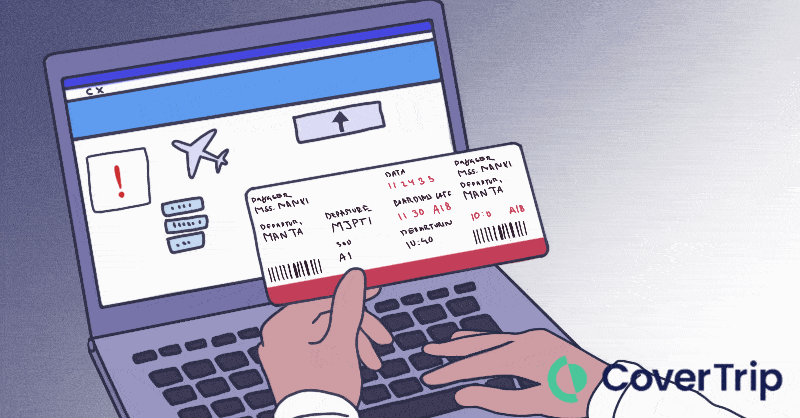A guide to booking separate tickets
6 December 2024
Like many people, I traveled last week to visit family for the holiday. I got a great deal on the long ‘leg’ of my trip and was able to upgrade our seats, but I needed to book separate second and third legs to get from the major airports to the smaller, regional airports.
The result was a flight itinerary that looked something like this:
- Smaller regional airport to LAX
- LAX – IAD
- IAD to the final regional airport
Then, I did the same in reverse. I ended up with three separate tickets, one for each step in the itinerary.
When one of my regional flights was delayed due to a mechanical issue, the entire trip was disrupted. Unfortunately, I checked bags because I had a lot to carry – presents, hiking boots, and bulky winter clothing.
Even though I booked my flights on the same airline, the separate confirmation numbers meant the entire itinerary wasn’t linked. While booking the separate tickets was smart financially, and it was possible to score an upgrade, my approach had some unforeseen risks that I’ll explain so you can avoid my mistakes.
Whether you’re trying to reach a regional airport not served by major carriers or looking to build in a multi-day stopover, understanding how to navigate separate tickets can make the difference between a smooth journey and a costly travel nightmare.

Understanding the risks of separate tickets
When you book separate tickets, you create independent contracts with each airline. Unlike connecting flights on a single ticket, where airlines must accommodate you if something goes wrong, separate tickets mean each airline is only responsible for their specific segment.
This fundamental difference means you’re taking on all the risk of making your connections.
- Airlines aren’t responsible for missed connections. If your first flight is delayed and you miss the second flight, the second airline has no obligation to rebook you – even if the delay wasn’t your fault.
- No automatic rebooking if delays occur. Unlike traditional connections, where airlines will automatically rebook you on the next available flight, separate tickets mean you’re on your own if things go wrong. You’ll need to handle all rebooking yourself.
- Same airline separate tickets – slightly better, but still has risks. Even when booking separate tickets on the same airline, most of the risks still apply. Some airlines may be more willing to help if things go wrong since you’re a loyal customer for both segments. The key is to let the airline know you have separate tickets and ask if they can “link” the reservations in their system.
Understanding the benefits of booking separate tickets
Despite the risks, there are benefits to booking separate tickets, primarily related to cost and flexibility.
If you’re traveling to a location that is best served by a regional airport, you’ll have better luck getting a cheaper flight from a major airport to a major airport. Then, you can book separate connecting flights from the major airport to the local regional airport. This often works well when you’re trying to redeem points, for example, as airlines often offer better redemption deals to certain airports, and you can score an award ticket or upgrade for much less.
Another reason to book separate tickets is flexibility. Sometimes your preferred airline doesn’t offer flights to the final destination, but they do to a nearby major airport. You can then use a low-cost carrier to get you to the final destination.
Finally, you may consider booking separate tickets to add a stopover on your trip. If you’re flying all the way to Europe, for example, you may want to spend an afternoon exploring Amsterdam before continuing on to your final destination.
Pro tip: When you fly transatlantic with Icelandair, you can choose to add a stopover in Iceland at no additional cost and visit the land of fire and ice for up to a week!
Strategic flight timing
Whether you’re flying on different airlines or the same airline, strategic flight timing is critical when booking separate tickets. If one flight is delayed, you may not have enough time to reach the next flight. If you’ve checked bags, you must collect them, re-check them on the next flight, and clear security again.
Pro tips for strategic flight timing with separate tickets:
- Verify whether the route you’re flying is typically delayed or not using FlightAware
- Consider overnight layovers or at least longer buffer times between flights
- Carefully review the airport maps so you can calculate how much time you need to get to the next flight
- Don’t check bags (just don’t, trust me on this!)
Luggage strategies for separate tickets
Through-checked bags on separate tickets is never guaranteed, even on the same airline. Your best bet is to skip checking bags entirely.
If you must check bags, you’ll need to handle your luggage between flights, which can mean collecting them at baggage claim, checking them onto the next flight, and then re-navigating security.
If you must check bags, remember that most airlines require bags to be checked 45-60 minutes prior to departure, so work backward from your second flight’s planned departure time and figure out how much time you’ll need to claim the bags, check them in at the next airline, and clear security again.
Pro tips for strategic luggage management with separate tickets:
- If the separate tickets are with the same airline, ask the check-in agent to link the tickets and check your bag through to the final destination
- Research the layover airport map to understand distances between baggage claim and check-in counters
- Check the luggage tags to make sure the bag is going to your final destination unless you want to pick it up at the next stop
- Keep all luggage claim tickets and take photos of your bags at each check-in point
Final word
Successfully managing separate ticket travel requires a delicate balance of careful planning, strategic timing, and backup preparations. Here are my final tips when booking separate tickets:
- When selecting flights, prioritize airlines within the same alliance even if booking separate tickets – this can sometimes lead to better customer service.
- When you arrive for the first flight, chat with the check-in agent and ask that they link the separate tickets – this can help with rebooking options if problems arise.
- Don’t check bags, and if you must, keep a carry-on with the essentials in case your bag’s itinerary differs from yours.
For many travelers, the extra effort of managing separate tickets is worth it for the flexibility and potential savings – just make sure you understand what you’re getting into before you book.
Related topics
Damian Tysdal is the founder of CoverTrip, and is a licensed agent for travel insurance (MA 1883287). He believes travel insurance should be easier to understand, and started the first travel insurance blog in 2006.
